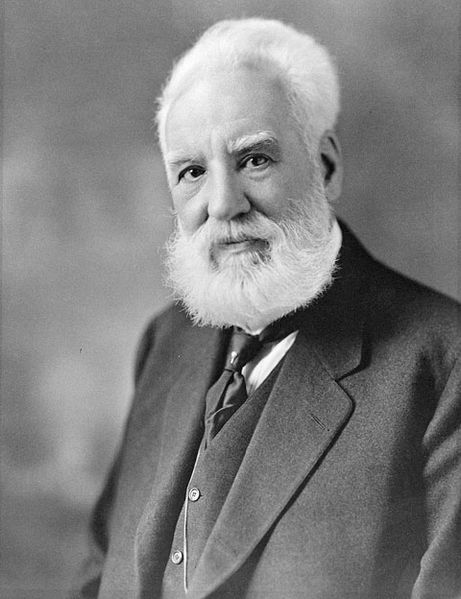
Missing from Thomas F. Glick’s What About Darwin? (2010) is Alexander Graham Bell (right; 1847–1922), who is usually credited with patenting the first practical telephone. Glick’s book, as I’ve mentioned here before, presents, in the words of its Victorian subtitle, “all species of opinion from scientists, sages, friends, and enemies who met, read, and discussed the naturalist who changed the world.” Reviewing it for Reports of the NCSE, I described it as “simply a delightful book to browse through” in part because there are so many unlikely people to be found in it offering their views on Darwin. But Bell, a prolific inventor, a leader in the eugenics movement, and a mover and shaker in the scientific establishment of his day (he helped to establish the journal Science, for example), was a likely candidate—and yet is not to be found there.
I discovered Bell’s absence from Glick’s book because I was mildly curious about a passage that appears from time to time in creationist literature. A representative occurrence is in Bryon C. Nelson’s “After Its Kind” (1927), which I discussed in “Haeckeling Darwin with a Full Nelson.” Nelson writes, “Alexander Graham Bell, the inventor of the telephone and a student of evolutionary problems, said, ‘Natural selection does not and cannot produce new species and varieties. On the contrary its sole function is to prevent evolution.’” He even provides a source: World’s Work, Dec. 1913, page 177. And there indeed appears a recognizable version of the quotation there, although after “varieties” there appears, following a comma, “or cause modifications of living organisms to come into existence.” The words are from Walter Archer Frost’s interview with Bell.
As is evident from the title of the interview—“A Race of Human Thoroughbreds”—Bell was talking about eugenics. He was rejecting “fantastic and impracticable schemes for … preventing the propagation of undesirable characteristics” in favor of encouraging the propagation of desirable characteristics. But his discussion of natural selection is confused. He seems to be arguing that just as natural selection against inferior characteristics cannot produce a superior human, artificial selection against inferior characteristics cannot do so. But by the same token, since he is explicitly in favor of artificial selection for superior characteristics, leading to “the evolution of a higher and nobler type of man,” he should allow that natural selection for superior characteristics can result in evolution!
At least on the evidence of “A Race of Human Thoroughbreds,” Bell seems to be not only confused about natural selection but also dubious about its efficacy. His doubt, at least, is understandable, for he was writing at a time that Julian Huxley dubbed the eclipse of Darwinism, when (as Huxley wrote in Evolution: The Modern Synthesis [1942]): “Zoologists who clung to Darwinian views were looked down on by the devotees of the newer disciplines, whether cytology or genetics, Entwicklungsmechanik or comparative physiology, as old-fashioned theorizers; and the theological philosophical antipathy to Darwin’s great mechanistic generalization could once more raise its head without fearing too violent a knock.” But his attitude toward evolution per se is not on display in the interview. So I sought it elsewhere—and found it, not in Glick’s book, but in a distinctly goofy context.
In a January 27, 1873, letter (PDF) to his parents and sister-in-law, Bell thanked them for a newspaper clipping about one Andre Foglin. I don’t know exactly which clipping he received, but there were a number of stories in the press at the time reporting various anatomical peculiarities of Foglin: “Andre’s chest was round as a shield, with an enormous development of pectoral muscle: his arms were exceedingly long, and in walking he would swing them like the arms of a windmill.” After he was killed in the Franco-Prussian War, he was autopsied, whereupon it was discovered that “[t]he clavicle, shoulder-blade[,] and sternum all exhibited wonderful abnormal modification in the direction of the bird skeleton.” His son, also named Andre, supposedly was “several degrees nearer to the bird type than his father was.”
Whether he found it plausible or goofy, the clipping provoked Bell to discourse on his attitude toward Darwin and evolution in general. He wrote, “Should young Andre Foglin live to perpetuate his 3 peculiarities, posterity may perhaps believe in Darwin as I do,” and continued by explaining:
I cannot understand the prejudice with which many people view an honest and hard-working investigator like Darwin.
Geology has shown us that the Scriptural account of the Creation cannot be taken in a literal sense. To me it is infinitely more reasonable to suppose that Man is lineally descended from a monkey, than that he was moulded out of a piece of dirt!
Indeed if we do not put our own interpretation on the old testament—I do not see how Darwinism is opposed to the Scriptures. Darwin has revealed laws by which (given an inconceivable length of time) the whole vegetable and animal kingdoms (including man) have been developed from inorganic elements—by only one simple art of creation. Geology has shown not only that that inconceivable length of time has existed, but has even recovered the remains of animals—that blend the characters of what are now distinct species of animals. Indeed several of Darwin’s theoretical animals and plants have been found to have had an actual existence.
When Africa—the home of the man-like apes—and doubtless the cradle of the human race—has been searched, we may look forward to the discovery of human fossils approaching still nearer the ape-forms—than the fossils men found in France—or the lower type of Africans. [emphasis in original; when the transcript diverged from the original, the original is followed]
I can’t say that I care for the racism of the last six words (though it should be said that his biographer Robert V. Bruce describes Bell as “too sensible, experienced, and decent a man to be a racist”—see his Bell: Alexander Graham Bell and the Conquest of Solitude [1973]). But otherwise it seems like a sound response to Darwin’s work—sound as a Bell.

